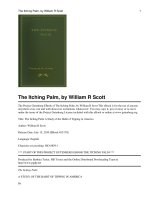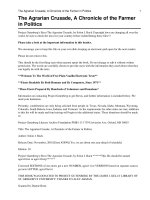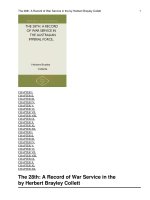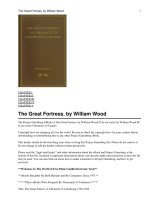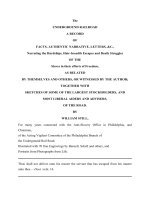The UNDERGROUND RAILROAD A RECORD OF FACTS, AUTHENTIC NARRATIVE, LETTERS potx
Bạn đang xem bản rút gọn của tài liệu. Xem và tải ngay bản đầy đủ của tài liệu tại đây (6.3 MB, 1,112 trang )
The
UNDERGROUND RAILROAD
A RECORD
OF
FACTS, AUTHENTIC NARRATIVE, LETTERS, &C.,
Narrating the Hardships, Hair-breadth Escapes and Death Struggles
OF THE
Slaves in their efforts of Freedom,
AS RELATED
BY THEMSELVES AND OTHERS, OR WITNESSED BY THE AUTHOR;
TOGETHER WITH
SKETCHES OF SOME OF THE LARGEST STOCKHOLDERS, AND
MOST LIBERAL AIDERS AND ADVISERS,
OF THE ROAD.
BY
WILLIAM STILL,
For many years connected with the Anti-
Slavery Office in Philidelphia, and
Chairman,
of the Acting Vigilent Committee of the Philadelphia Branch of
the Underground Rail Road.
Illustrated with 70 fine Engravings by Bensell, Schell and others, and
Portraits from Photographs from Life.
Thou shall not deliver unto his master the servant that has escaped from his master
unto thee.—Deut. xxiii. 16.
SOLD ONLY BY SUBSCRIPTION.
PHILADELPHIA:
PORTER & COATES,
822, CHESTNUT STREET.
1872.
Entered according to act of Congress, in the year 1871, by
W.M. STILL,
In the Office of the Librarian of Congress, at Washington.
W. Still
PREFACE TO REVISED EDITION.
* * * * *
Like millions of my race, my mother and father were born slaves, but were not
contented to live and die so. My father purchased himself in early manhood by hard
toil. Mother saw no way for herself and children to escape the horrors of bondage but
by flight. Bravely, with her four little ones, with firm faith in God and an ardent desire
to be free, she forsook the prison-house, and succeeded, through the aid of my father,
to reach a free State. Here life had to be begun anew. The old familiar slave names
had to be changed, and others, for prudential reasons, had to be found. This was not
hard work. However, hardly months had passed ere the keen scent of the slave-hunters
had trailed them to where they had fancied themselves secure. In those days all power
was in the hands of the oppressor, and the capture of a slave mother and her children
was attended with no great difficulty other than the crushing of freedom in the breast
of the victims. Without judge or jury, all were hurried back to wear the yoke again.
But back this mother was resolved never to stay. She only wanted another opportunity
to again strike for freedom. In a few months after being carried back, with only two of
her little ones, she took her heart in her hand and her babes in her arms, and this trial
was a success. Freedom was gained, although not without the sad loss of her two older
children, whom she had to leave behind. Mother and father were again reunited in
freedom, while two of their little boys were in slavery. What to do for them other than
weep and pray, were questions unanswerable. For over forty years the mother's heart
never knew what it was to be free from anxiety about her lost boys. But no tidings
came in answer to her many prayers, until one of them, to the great astonishment of
his relatives, turned up in Philadelphia, nearly fifty years of age, seeking his long-lost
parents. Being directed to the Anti-Slavery Office for instructions as to the best plan
to adopt to find out the whereabouts of his parents, fortunately he fell into the hands of
his own brother, the writer, whom he had never heard of before, much less seen or
known. And here began revelations connected with this marvellous coincidence,
which influenced me, for years previous to Emancipation, to preserve the matter found
in the pages of this humble volume.
And in looking back now over these strange and eventful Providences, in the light of
the wonderful changes wrought by Emancipation, I am more and more constrained to
believe that the reasons, which years ago led me to aid the bondman and preserve the
records of his sufferings, are to-day quite as potent in convincing me that the necessity
of the times requires this testimony.
And since the first advent of my book, wherever reviewed or read by leading friends
of freedom, the press, or the race more deeply represented by it, the expressions of
approval and encouragement have been hearty and unanimous, and the thousands of
volumes which have been sold by me, on the subscription plan, with hardly any
facilities for the work, makes it obvious that it would, in the hands of a competent
publisher, have a wide circulation.
And here I may frankly state, that but for the hope I have always cherished that this
work would encourage the race in efforts for self-elevation, its publication never
would have been undertaken by me.
I believe no more strongly at this moment than I have believed ever since the
Proclamation of Emancipation was made by Abraham Lincoln, that as a class, in this
country, no small exertion will have to be put forth before the blessings of freedom
and knowledge can be fairly enjoyed by this people; and until colored men manage by
dint of hard acquisition to enter the ranks of skilled industry, very little substantial
respect will be shown them, even with the ballot-box and musket in their hands.
Well-conducted shops and stores; lands acquired and good farms managed in a
manner to compete with any other; valuable books produced and published on
interesting and important subjects—these are some of the fruits which the race are
expected to exhibit from their newly gained privileges.
If it is asked "how?" I answer, "through extraordinary determination and endeavor,"
such as are demonstrated in hundreds of cases in the pages of this book, in the
struggles of men and women to obtain their freedom, education and property.
These facts must never be lost sight of.
The race must not forget the rock from whence they were hewn, nor the pit from
whence, they were digged.
Like other races, this newly emancipated people will need all the knowledge of their
past condition which they can get.
The bondage and deliverance of the children of Israel will never be allowed to sink
into oblivion while the world stands.
Those scenes of suffering and martyrdom millions of Christians were called upon to
pass through in the days of the Inquisition are still subjects of study, and have
unabated interest for all enlightened minds.
The same is true of the history of this country. The struggles of the pioneer fathers are
preserved, produced and re-produced, and cherished with undying interest by all
Americans, and the day will not arrive while the Republic exists, when these histories
will not be found in every library.
While the grand little army of abolitionists was waging its untiring warfare for
freedom, prior to the rebellion, no agency encouraged them like the heroism of
fugitives. The pulse of the four millions of slaves and their desire for freedom, were
better felt through "The Underground Railroad," than through any other channel.
Frederick Douglass, Henry Bibb, Wm. Wells Brown, Rev. J.W. Logan, and others,
gave unmistakable evidence that the race had no more eloquent advocates than its own
self-emancipated champions.
Every step they took to rid themselves of their fetters, or to gain education, or in
pleading the cause of their fellow-bondmen in the lecture-room, or with their pens,
met with applause on every hand, and the very argument needed was thus furnished in
large measure. In those dark days previous to emancipation, such testimony was
indispensable.
The free colored men are as imperatively required now to furnish the same manly
testimony in support of the ability of the race to surmount the remaining obstacles
growing out of oppression, ignorance, and poverty.
In the political struggles, the hopes of the race have been sadly disappointed. From
this direction no great advantage is likely to arise very soon.
Only as desert can be proved by the acquisition of knowledge and the exhibition of
high moral character, in examples of economy and a disposition to encourage
industrial enterprises, conducted by men of their own ranks, will it be possible to
make political progress in the face of the present public sentiment.
Here, therefore, in my judgment is the best possible reason for vigorously pushing the
circulation of this humble volume—that it may testify for thousands and tens of
thousands, as no other work can do.
WILLIAM STILL, Author.
September, 1878. Philadelphia, Pa.
ILLUSTRATIONS.
THE AUTHOR
PETER STILL—"THE KIDNAPPED AND THE RANSOMED"
CHARITY STILL TWICE ESCAPED FROM SLAVERY
DESPERATE CONFLICT IN A BARN
DEATH OF ROMULUS HALL
RESURRECTION OF HENRY BOX BROWN
RESCUE OF JANE JOHNSON AND HER CHILDREN
PASSMORE WILLIAMSON
JANE JOHNSON
ESCAPING FROM PORTSMOUTH, VA
TWENTY-EIGHT FUGITIVES ESCAPING FROM EASTERN SHORE OF
MARYLAND
ESCAPING FROM ALABAMA ON TOP OF A CAR
THE RIVER ON HORSEBACK IN THE NIGHT
A BOLD STROKE FOR FREEDOM—CONTEST WITH FIRE-ARMS
ABRAM GALLOWAY
THE MAYOR AND POLICE OF NORFOLK SEARCHING CAPTAIN
FOUNTAIN'S SCHOONER
MARIA WEEMS ESCAPING AS JO WRIGHT
JOHN HENRY HILL
DRY-GOODS MERCHANT SEARCHING THE CARS
ESCAPE WITH A LADY, AS HER COACHMAN, WITH MASTER'S
HORSE AND CARRIAGE
SIX ON TWO HORSES
UP A TREE
SAMUEL GREEN SENTENCED TO THE PENITENTIARY FOR TEN
YEARS FOR HAVING A COPY OF "UNCLE TOM'S CABIN" IN HIS
HOUSE
LEAR GREEN ESCAPING IN A CHEST
ESCAPE OF ELEVEN PASSENGERS FROM MARYLAND IN TWO
CARRIAGES
THE CHRISTIANA TRAGEDY
WILLIAM AND ELLEN CRAFT
MEMBERS OF THE ACTING COMMITTEE:
o N.W. DEPEE
o JACOB C. WHITE
o CHARLES WISE
o EDWIN H. COATES
KNIFING HIS VICTIM
LIVING IN A HOLLOW TREE
IN A CAVE
A NARROW ESCAPE
SUSPENDED BY THE HANDS WITH BLOCK AND TACKLE
CROSSING THE BAY
BREAKING HIM IN
MOTHER ESCAPING WITH SEVEN CHILDREN
FIGHT IN CHESAPEAKE BAY
JOHN W. DUNGEE
MARY MILBURN (SECRETED IN A BOX)
HEAVY WEIGHTS—ARRIVAL OF A PARTY AT LEAGUE ISLAND
SKETCHES AND PORTRAITS OF STATION-MASTERS, PROMINENT
ANTI-SLAVERY MEN, AND SUPPORTERS OF THE U.G.R.R.:
o ABIGAIL GOODWIN
o THOMAS GARRETT
o DANIEL GIBBONS
o LUCRETIA MOTT
o J. MILLER M'KIM
o WILLIAM H. FURNESS
o WILLIAM LLOYD GARRISON
o LEWIS TAPPAN
o ELIJAH F. PENNYPACKER
o WILLIAM WRIGHT
o DR. BARTHOLOMEW FUSSELL
o ROBERT PURVIS
o JOHN HUNN
o SAMUEL RHOADS
o WILLIAM WHIPPER
o SAMUEL D. BURRIS
o CHARLES D. CLEVELAND
o GRACE ANNA LEWIS
o MRS. FRANCES E.W. HARPER
o JOHN NEEDLES
CONTENTS.
SETH CONCKLIN
UNDERGROUND RAILROAD LETTERS.
From Thomas Garrett—G.A. Lewis—E.L. Stevens—Sydney Howard Gay—
John Henry Hill—J. Bigelowe—Ham and Eggs—Rev. H. Wilson—Sheridan
Ford—E.F. Pennypacker—J.C. Bustill—Slave secreted in Richmond—G.S.
Nelson—John Thompson—Wm. Penn
WILLIAM BOX PEEL JONES
Came boxed up viâ Erricson line of Steamers.
WESLEY HARRIS ALIAS ROBERT JACKSON, CRAVEN MATTERSON
AND TWO BROTHERS.
CLARISSA DAVIS
Arrived in Male Attire.
ANTHONY BLOW ALIAS HENRY LEVISON
Secreted Ten Months—Eight days on the Steamship City of Richmond bound
for Philadelphia.
PERRY JOHNSON, OF ELKTON, MARYLAND.
Eye knocked Out.
ISAAC FORMAN, WILLIAM DAVIS AND WILLIS REDICK.
Hearts full of joy for Freedom—Very anxious for Wives in Slavery.
JOSEPH HENRY CAMP
Sold, the day he escaped, for Fourteen Hundred Dollars—Slave Trader loses
his Bargain.
SHERIDAN FORD
Secreted in the Woods—Escapes in a Steamer.
JOSEPH KNEELAND ALIAS JOSEPH HULSON
Young Master had a "Malignant Spirit".
EX-PRESIDENT TYLER'S HOUSEHOLD LOSES AN ARISTOCRATIC
ARTICLE.
EDWARD MORGAN, HENRY JOHNSON, JAMES AND STEPHEN
BUTLER.
"Two Thousand Dollars Reward" offered.
HENRY PREDO
Daniel Hughes, Thomas Elliott, and five others betrayed into Dover Jail.
MARY EPPS ALIAS EMMA BROWN, JOSEPH AND ROBERT
ROBINSON.
A Slave Mother Loses her Speech at the Sale of her Child Bob Escapes from
his Master, a Trader, with Fifteen Hundred Dollars in North Carolina Money.
GEORGE SOLOMON, DANIEL NEALL, BENJAMIN R.
FLETCHER AND MARIA DORSEY.
HENRY BOX BROWN
Arrived by Adams Express.
TRIAL OF THE EMANCIPATORS OF COL. J.H. WHEELER'S SLAVES,
JANE JOHNSON AND HER TWO LITTLE BOYS.
THE ARRIVALS OF A SINGLE MONTH.
Sixty Passengers came in one Month—Twenty-eight in one Arrival—Great
Panic and Indignation Meeting—Interesting Correspondence from Masters and
Fugitives.
A SLAVE GIRL'S NARRATIVE.
Cordelia Loney, Slave of Mrs. Joseph Cahell, (widow of the late Hon. Joseph
Cahell, of Virginia)—Cordelia's Escape from her Mistress in Philadelphia.
ARRIVAL OF JACKSON, ISAAC AND EDMONDSON TURNER FROM
PETERSBURG.
Touching Scene on Meeting their Old Blind Father at the U.G.R.R. Depot.
ROBERT BROWN ALIAS THOMAS JONES.
Crossing the River on Horseback in the Night.
ANTHONY LONEY ALIAS WILLIAM ARMSTEAD AND CORNELIUS
SCOTT.
SAMUEL WILLIAMS ALIAS JOHN WILLIAMS.
BARNABY GRIGBY ALIAS JOHN BOYER, AND MARY ELIZABETH
HIS WIFE, FRANK WANZER ALIAS ROBERT SCOTT, EMILY FOSTER
ALIAS ANN WOOD.
WILLIAM JORDAN ALIAS WILLIAM PRICE.
JOSEPH GRANT AND JOHN SPEAKS.
Two Passengers viâ Liverpool.
WILLIAM N. TAYLOR.
"One Hundred Dollars Reward".
LOUISA BROWN, JACOB WATERS, AND ALFRED GOULDEN.
ARRIVAL FROM BALTIMORE.
Jefferson Pipkins alias David Jones, Louisa Pipkins, Elizabeth Brit, Harriet
Brown, alias Jane Wooton, Gracy Murry alias Sophia Sims, Edward
Williams alias Henry Johnson, Charles Lee alias Thomas Bushier.
SEVERAL ARRIVALS FROM DIFFERENT PLACES.
Henry Anderson, Charles and Margaret Congo, Chaskey Brown, William
Henry Washington, James Alfred Frisley, Charles Henry Salter, Stephen
Taylor, Charles Brown, Charles H. Hollis, Luther Dorsey.
ARRIVAL FROM RICHMOND.
Jeremiah W. Smith and wife Julia.
EIGHT ARRIVALS.
James Massey, Perry Henry Trusty, George Rhoads, James Rhoads, George
Washington, Sarah Elizabeth Rhoads, and Child, Mary Elizabeth Stephenson.
CHARLES THOMPSON.
Carrier of "The National American".
BLOOD FLOWED FREELY.
Abram Galloway and Richard Eden—Secreted in a Vessel Loaded with Spirits
of Turpentine—Shrouds Prepared to Prevent being Smoked to Death—Abram
a Soldier under Father Abraham—Senator of North Carolina.
JOHN PETTIFOOT.
"One Hundred Dollars Reward" Offered—McHenry and McCulloch Anxious
About John.
EMANUEL T. WHITE.
"Would rather Fight than Eat".
THE ESCAPE OF A CHILD FOURTEEN MONTHS OLD.
Letter from "J.B."—Letters from E.L. Stevens Great Anxiety and Care.
ESCAPE OF A YOUNG SLAVE MOTHER.
Baby, Little Girl and Husband left Behind—Three Hundred Dollars Reward
Offered.
SAMUEL W. JOHNSON.
Arrival from the Richmond Daily Dispatch Office—"Uncle Tom's Cabin"
turned Sam's Brain—Affecting Letters.
FAMILY FROM BALTIMORE.
Stephen Amos alias Henry Johnson, Harriet alias Mary Jane Johnson, and their
four children, Ann Rebecca, William H., Elizabeth and Mary Ellen.
ELIJAH HILTON.
From Richmond—"Five Hundred Dollars Reward" offered by R.J. Christian
Grateful letter from Canada.
SOLOMON BROWN.
Arrived per City of Richmond—Letter from Canada containing expressions of
Gratitude.
WILLIAM HOGG ALIAS JOHN SMITH.
Traveler from Maryland—William was much troubled about his Wife left
behind—Letter from Canada.
TWO FEMALE PASSENGERS FROM MARYLAND.
Ann Johnson and Lavina Woolfley Sold—Out of the Frying Pan into the Fire.
CAPTAIN F. AND THE MAYOR OF NORFOLK.
Twenty-one Passengers secreted in Captain Fountain's Boat—Mayor and Posse
of Officers on the Boat searching for U.G.R.R. Passengers.
ARRIVALS FROM DIFFERENT PLACES.
Matilda Mahoney—Dr. J.W. Pennington's Brother and Sons—Great Adventure
to deliver a Lover.
FLEEING GIRL OF FIFTEEN IN MALE ATTIRE.
Ann Maria Weems alias Joe Wright—Great Triumph—Arrival on
Thanksgiving Day—Interesting letters from J. Bigelow.
FIVE YEARS AND ONE MONTH SECRETED.
John Henry, Hezekiah and James Hill.
FROM VIRGINIA, MARYLAND AND DELAWARE.
Archer Barlow, alias Emet Robins—Samuel Bush alias William Oblebee—
John Spencer and his son William and James Albert—Robert Fisher—
NATHAN HARRIS—Hansel Waples—Rosanna Tonnell,alias Maria Hyde—
Mary Ennis alias Licia Hemmit and two Children—Lydia and Louisa Caroline.
SAM, ISAAC, PERRY, CHARLES AND GREEN.
"One Thousand Dollars Reward".
FROM RICHMOND AND NORFOLK, VA.
William B. White, Susan Brooks, and Wm. Henry Atkinson.
FOUR ARRIVALS.
Charlotte and Harriet escape in deep Mourning—White Lady and Child with a
Colored Coachman—Three likely Young Men from Baltimore—Four large and
two Small Hams—U.G.R.R. Passengers Travelling with their Master's Horses
and Carriage—Six Passengers on two Horses, &c.
FROM VIRGINIA, MARYLAND, DELAWARE, NORTH CAROLINA,
WASHINGTON, D.C. AND SOUTH CAROLINA.
CHARLES GILBERT,
Fleeing from Davis, a Negro Trader—Secreted under a Hotel—Up a Tree—
Under a Floor—In a Thicket—On a Steamer.
LIBERTY OR DEATH.
Jim Bowlegs alias Bill Paul.
SALT-WATER FUGITIVE.
SAMUEL GREEN ALIAS WESLEY KINNARD.
Ten Years in the Penitentiary for having a Copy of Uncle Tom's Cabin in his
House.
AN IRISH GIRL'S DEVOTION TO FREEDOM.
In Love with a Slave—Gets him off to Canada—Follows him—Marriage, &c.
"SAM" NIXON ALIAS DR. THOMAS BAYNE.
The Escape of a Dentist on the U.G.R.R. &c.
SUNDRY ARRIVALS.
From Loudoun County, Va., Norfolk, Baltimore, Md., Petersburg, Va., &c.
HEAVY REWARD.
"Two Thousand Six Hundred Dollars Reward" Offered.
SLAVE-TRADER HALL IS FOILED.
Robert McCoy alias William Donar, and Elizabeth Sanders, arrived per
steamer.
THE PROTECTION OF SLAVE PROPERTY IN VIRGINIA.
A Bill providing additional Protection for the Slave Property of Citizens of this
Commonwealth.
ESCAPING IN A CHEST.
"One Hundred and Fifty Dollars Reward"—Lear Green.
ISAAC WILLIAMS, HENRY BANKS AND KIT NICKLESS.
ARRIVAL OF FIVE PROM THE EASTERN SHORE OF MARYLAND.
Cyrus Mitchell alias John Steel, Joshua Handy alias Hambleton
Hamby, Charles Button alias William Robinson, Ephraim Hudson alias John
Spry, Francis Molock alias Thomas Jackson.
SUNDRY ARRIVALS ABOUT AUGUST 1ST, 1855.
Francis Hilliard and Others.
DEEP FURROWS ON THE BACK.
Thomas Madden.
PETER MATHEWS ALIAS SAMUEL SPARROWS.
"I might as well be in the Penitentiary as in Slavery."
"MOSES" ARRIVES WITH SIX PASSENGERS.
ESCAPED FROM "A WORTHLESS SOT."
John Atkinson.
WILLIAM BUTCHER ALIAS Wm. T. MTCHELL.
"He was abuseful".
"WHITE ENOUGH TO PASS".
ESCAPING WITH MASTER'S CARRIAGES AND HORSES.
Harriet Shephard, and her five Children with five other Passengers.
EIGHT AND A HALF MONTHS SECRETED.
Washington Somlor alias James Moore.
ARTHUR FOWLER ALIAS BENJAMIN JOHNSON.
SUNDRY ARRIVALS.
About the 1st of June, 1855—Emory Roberts and others.
SUNDRY ARRIVALS ABOUT JANUARY 1ST, 1855.
Verenea Mercer and others.
SLAVE-HOLDER IN MARYLAND WITH THREE COLORED WIVES.
James Griffin alias Thomas Brown.
CAPTAIN F. ARRIVES WITH NINE PASSENGERS.
Names of Passengers.
OWEN AND OTHO TAYLOR'S FLIGHT WITH HORSES, &c.
HEAVY REWARD.
Three Hundred Dollars Reward—"Tom" gone.
CAPT. F. ARRIVES WITH FOURTEEN "PRIME ARTICLES" ON BOARD.
SUNDRY ARRIVALS, LATTER PART OF DECEMBER, 1855, AND
BEGINNING OF JANUARY, 1856.
Joseph Cornish and others.
PART OF THE ARRIVALS IN DECEMBER, 1855.
Thomas J. Gooseberry and others.
THE FUGITIVE SLAVE BILL OF 1850.
"An Act Respecting Fugitives from Justice, and Persons Escaping from the
Services of their Masters."
THE SLAVE HUNTING TRAGEDY IN LANCASTER COUNTY, IN
SEPTEMBER, 1851.
"Treason at Christiana".
WILLIAM AND ELLEN CRAFT.
Female Slave in Male Attire, fleeing as a Planter, with her Husband as her
Body Servant.
ARRIVALS FROM RICHMOND.
Lewis Cobb and Nancy Brister.
PASSENGERS FROM NORTH CAROLINA, [By SCHOONER.]
Major Latham, William Wilson, Henry Goram, Wiley Madison, and Andrew
Shepherd.
THOMAS CLINTON, SAUNEY PRY AND BENJAMIN DUCKET.
Passed over the U.G.R.R. in the Fall of 1856.
ARRIVALS IN APRIL, 1856.
Charles Hall and others.
FIVE FROM GEORGETOWN CROSS-ROADS.
Mother and Child from Norfolk, Va., &c.
PASSENGERS FROM MARYLAND.
William Henry MOODY, BELINDA BIVANS, &c.
ARRIVAL FROM MARYLAND.
ARRIVAL FROM WASHINGTON, D.C., &c., 1857.
George Carroll, Randolph Branson, John Clagart and William Royan.
ARRIVAL FROM UNIONVILLE, 1857.
Israel Todd and Bazil Aldridge.
ARRIVAL FROM MARYLAND, 1857.
Ordee Lee and Richard J. Booce.
ARRIVAL FROM CAMBRIDGE, 1857.
Silas Long and Solomon Light—"The Mother of Twelve Children"—Old Jane
Davis.
BENJAMIN ROSS AND HIS WIFE HARRIET
Fled from Caroline County, Eastern Shore of Maryland, June, 1857.
ARRIVAL FROM VIRGINIA, 1857.
ARRIVAL FROM DELAWARE, 1857.
ARRIVAL FROM ALEXANDRIA, IN 1857.
ARRIVAL FROM UNIONVILLE, 1857.
FROM NEW ORLEANS, 1857.
ARRIVAL FROM WASHINGTON, D.C.
ARRIVAL FROM VIRGINIA, 1857.
ARRIVAL FROM MARYLAND.
ARRIVAL FROM GEORGETOWN CROSS ROADS AND ALEXANDRIA.
ARRIVAL FROM MARYLAND.
ARRIVAL FROM NORFOLK, VA.
ARRIVAL FROM WASHINGTON, D.C.
FOUR ABLE BODIED "ARTICLES" IN ONE ARRIVAL, 1857.
ARRIVAL FROM ARLINGTON, MD., 1857.
FIVE PASSENGERS, 1847.
ARRIVAL FROM HOWARD COUNTY, MD., 1857.
ARRIVAL FROM PRINCE GEORGE'S COUNTY, MD.
ARRIVAL FROM RAPPAHANNOCK COUNTY, 1857.
ARRIVAL FROM NORTH CAROLINA, 1857.
ALFRED HOLLON, GEORGE AND CHARLES N. RODGERS.
ARRIVAL FROM KENT COUNTY, 1857.
ARRIVAL FROM BALTIMORE COUNTY, 1857.
MARY COOPER AND MOSES ARMSTEAD, 1857.
ARRIVAL FROM NEAR WASHINGTON, D.C.
HON. L. McLANE'S PROPERTY, SOON AFTER HIS DEATH, TRAVELS
VIA THE UNDERGROUND RAIL ROAD—WILLIAM KNIGHT, ESQ.
LOSES A SUPERIOR "ARTICLE."
ARRIVAL FROM HARFORD COUNTY, 1857.
ARRIVAL FROM MARYLAND, 1857.
ARRIVAL FROM NORFOLK, VA., 1857.
ARRIVAL FROM HOOPERVILLE, MD., 1857.
ARRIVAL FROM MARYLAND, 1857.
ARRIVAL FROM QUEEN ANNE COUNTY, 1858.
ARRIVAL FROM BALTIMORE.
ARRIVED FROM DUNWOODY COUNTY, 1858.
ARRIVED FROM ALEXANDRIA, VA., 1857.
ARRIVAL FROM MARYLAND, 1858.
ARRIVAL FROM PETERSBURG, 1858.
ARRIVAL FROM MARYLAND.
ARRIVAL OF A PARTY OF SIX, 1858.
ARRIVAL FROM RICHMOND, 1858.
ARRIVAL FROM BALTIMORE, 1858.
ARRIVAL FROM HIGHTSTOWN, 1858.
ARRIVAL FROM VIRGINIA, 1858.
ARRIVAL FROM BELLAIR.
ARRIVAL FROM MARYLAND, 1858.
ARRIVAL FROM VIRGINIA, 1858.
ARRIVAL FROM RICHMOND, 1858.
ARRIVAL FROM NORFOLK, VA., 1858.
ARRIVAL FROM NEAR BALTIMORE, 1858.
ARRIVAL FROM VIRGINIA, 1858.
ARRIVAL FROM WASHINGTON, 1858.
ARRIVAL FROM VIRGINIA, 1858.
ARRIVAL FROM THE OLD DOMINION.
ARRIVAL FROM DELAWARE, 1858.
ARRIVAL FROM DELAWARE, 1858.
ARRIVAL FROM MARYLAND, 1858.
ARRIVAL FROM NORTH CAROLINA AND DELAWARE.
ARRIVAL FROM MARYLAND.
ARRIVAL FROM MARYLAND.
ARRIVAL FROM THE DISTRICT OF COLUMBIA, 1858.
ARRIVAL FROM HONEY BROOK TOWNSHIP, 1858.
ARRIVAL FROM ALEXANDRIA, VA., 1858.
ARRIVAL FROM THE SEAT OF GOVERNMENT.
CROSSING THE BAY IN A SKIFF.
ARRIVAL FROM KENT COUNTY, MD., 1858.
ARRIVAL FROM WASHINGTON, 1858.
ARRIVAL FROM CECIL COUNTY, 1858.
ARRIVAL FROM GEORGETOWN, D.C., 1858.
ARRIVAL FROM SUSSEX COUNTY, 1858.
SUNDRY ARRIVALS IN 1859.
ARRIVAL FROM RICHMOND, 1859.
ARRIVAL FROM DELAWARE, 1858.
ARRIVAL FROM RICHMOND, 1859.
ARRIVAL FROM MARYLAND, 1859.
SUNDRY ARRIVALS, 1859.
ARRIVAL FROM MARYLAND, 1859.
ARRIVAL FROM DELAWARE, 1859.
ARRIVAL FROM VIRGINIA, 1859.
SUNDRY ARRIVALS FROM MARYLAND, 1859.
ARRIVAL FROM RICHMOND, 1859.
ARRIVAL FROM MARYLAND.
ARRIVAL FROM MARYLAND, VIRGINIA, AND THE DISTRICT OF
COLUMBIA.
SUNDRY ARRIVALS FROM MARYLAND AND VIRGINIA.
ARRIVAL FROM SEAFORD, 1859.
ARRIVAL FROM TAPS' NECK, MD., 1859.
ARRIVAL FROM MARYLAND, 1859.
SUNDRY ARRIVALS FROM VIRGINIA, MARYLAND AND
DELAWARE.
ARRIVAL FROM DIFFERENT POINTS.
SUNDRY ARRIVALS FROM MARYLAND, 1860.
ARRIVAL FROM VIRGINIA, 1860.
ARRIVAL FROM BALTIMORE, 1860.
ARRIVAL FROM MARYLAND.
ARRIVAL FROM FREDERICKSBURG, 1860.
SUNDRY ARRIVALS FROM MARYLAND, 1860.
CROSSING THE BAY IN A BATTEAU.
ARRIVAL FROM DORCHESTER COUNTY, 1860.
ARRIVAL FROM MARYLAND, 1860.
TWELVE MONTHS IN THE WOODS, 1860.
ARRIVAL FROM MARYLAND.
A SLAVE CATCHER CAUGHT IN HIS OWN TRAP.
TO WHOM IT MIGHT CONCERN.
ARRIVAL FROM RICHMOND, 1858.
ARRIVAL FROM RICHMOND, 1859.
ARRIVAL FROM RICHMOND.
"AUNT HANNAH MOORE."
KIDNAPPING OF RACHEL AND ELIZABETH PARKER—MURDER OF
JOSEPH C. MILLER, IN 1851 AND 1852.
ARRIVAL FROM VIRGINIA, 1854.
ARRIVAL FROM NORFOLK.
ARRIVAL OF FIFTEEN FROM NORFOLK, VIRGINIA.
THE CASE OF EUPHEMIA WILLIAMS.
HELPERS AND SYMPATHIZERS AT HOME AND ABROAD—
INTERESTING LETTERS.
PAMPHLET AND LETTERS.
LETTERS TO THE WRITER.
WOMAN ESCAPING IN A BOX, 1857.
ORGANIZATION OF THE VIGILANCE COMMITTEE.
PORTRAITS AND SKETCHES.
ESTHER MOORE.
ABIGAIL GOODWIN.
THOMAS GARRETT.
DANIEL GIBBONS.
LUCRETIA MOTT.
JAMES MILLER McKIM.
WILLIAM H. FURNESS, D.D.
WILLIAM LLOYD GARRISON.
LEWIS TAPPAN.
ELIJAH F. PENNYPACKER.
WILLIAM WRIGHT.
DR. BARTHOLOMEW FUSSELL.
THOMAS SHIPLEY.
ROBERT PURVIS.
JOHN HUNN.
SAMUEL RHOADS.
GEORGE CORSON.
CHARLES D. CLEVELAND.
WILLIAM WHIPPER.
ISAAC T. HOPPER.
SAMUEL D. BURRIS.
MARIANN, GRACE ANNA, AND ELIZABETH R. LEWIS.
CUNNINGHAM'S RACHE.
FRANCES ELLEN WATKINS HARPER.
THE
UNDERGROUND RAILROAD
* * * * *
SETH CONCKLIN.
In the long list of names who have suffered and died in the cause of freedom, not one,
perhaps, could be found whose efforts to redeem a poor family of slaves were more
Christlike than Seth Concklin's, whose noble and daring spirit has been so long
completely shrouded in mystery. Except John Brown, it is a question, whether his
rival could be found with respect to boldness, disinterestedness and willingness to be
sacrificed for the deliverance of the oppressed.
By chance one day he came across a copy of the Pennsylvania Freeman, containing
the story of Peter Still, "the Kidnapped and the Ransomed,"—how he had been torn
away from his mother, when a little boy six years old; how, for forty years and more,
he had been compelled to serve under the yoke, totally destitute as to any knowledge
of his parents' whereabouts; how the intense love of liberty and desire to get back to
his mother had unceasingly absorbed his mind through all these years of bondage;
how, amid the most appalling discouragements, prompted alone by his undying
determination to be free and be reunited with those from whom he had been sold
away, he contrived to buy himself; how, by extreme economy, from doing over-work,
he saved up five hundred dollars, the amount of money required for his ransom,
which, with his freedom, he, from necessity, placed unreservedly in the confidential
keeping of a Jew, named Joseph Friedman, whom he had known for a long time and
could venture to trust,—how he had further toiled to save up money to defray his
expenses on an expedition in search of his mother and kindred; how, when this end
was accomplished, with an earnest purpose he took his carpet-bag in his hand, and his
heart throbbing for his old home and people, he turned his mind very privately
towards Philadelphia, where he hoped, by having notices read in the colored churches
to the effect that "forty-one or forty-two years before two little boys
A
were kidnapped
and carried South"—that the memory of some of the older members might recall the
circumstances, and in this way he would be aided in his ardent efforts to become
restored to them.
A: Sons of Levin and Sidney—the last names of his parents he was too young to
remember.
And, furthermore, Seth Concklin had read how, on arriving in Philadelphia, after
traveling sixteen hundred miles, that almost the first man whom Peter Still sought
advice from was his own unknown brother (whom he had never seen or heard of),
who made the discovery that he was the long-lost boy, whose history and fate had
been enveloped in sadness so long, and for whom his mother had shed so many tears
and offered so many prayers, during the long years of their separation; and, finally,
how this self-ransomed and restored captive, notwithstanding his great success, was
destined to suffer the keenest pangs of sorrow for his wife and children, whom he had
left in Alabama bondage.
Seth Concklin was naturally too singularly sympathetic and humane not to feel now
for Peter, and especially for his wife and children left in bonds as bound with them.
Hence, as Seth was a man who seemed wholly insensible to fear, and to know no other
law of humanity and right, than whenever the claims of the suffering and the wronged
appealed to him, to respond unreservedly, whether those thus injured were amongst
his nearest kin or the greatest strangers,—it mattered not to what race or clime they
might belong,—he, in the spirit of the good Samaritan, owning all such as his
neighbors, volunteered his services, without pay or reward, to go and rescue the wife
and three children of Peter Still.
The magnitude of this offer can hardly be appreciated. It was literally laying his life
on the altar of freedom for the despised and oppressed whom he had never seen,
whose kins-folk even he was not acquainted with. At this juncture even Peter was not
prepared to accept this proposal. He wanted to secure the freedom of his wife and
children as earnestly as he had ever desired to see his mother, yet he could not, at first,
hearken to the idea of having them rescued in the way suggested by Concklin, fearing
a failure.
To J.M. McKim and the writer, the bold scheme for the deliverance of Peter's family
was alone confided. It was never submitted to the Vigilance Committee, for the
reason, that it was not considered a matter belonging thereto. On first reflection, the
very idea of such an undertaking seemed perfectly appalling. Frankly was he told of
the great dangers and difficulties to be encountered through hundreds of miles of slave

